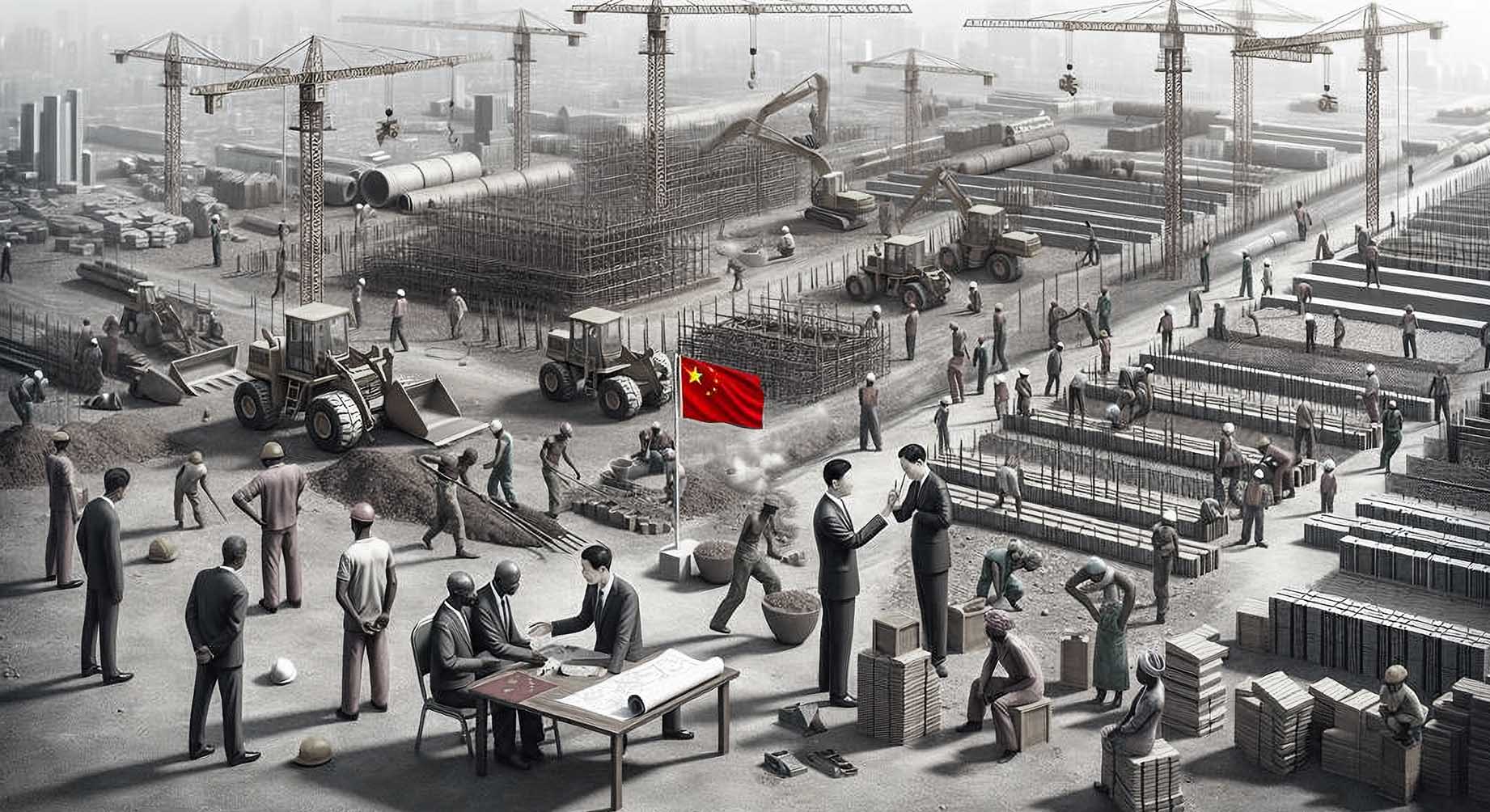

The Role of China in African Development – Luqman Jama
With the world experiencing dramatic global political changes, we could soon see China as the major political cultivator and harvester of Africa’s natural resources. The establishment of the Sino-African relationship has been triggered by China’s rapid economic growth and the burgeoning of its middle class. As observed by Albert (2017), China perceives Africa as a strategic partner in securing the long-term energy supplies needed to sustain its industrialization process. The need for secure access to oil supplies and other raw materials has compelled China to overlook political and security risks in Africa and invest heavily in key sectors such as mining in exchange for advantageous trade deals to secure a market for China's manufactured goods. According to Albert (2017), Chinese companies have greatly intensified their business pursuits across Africa in strategic sectors such as agriculture, manufacturing, infrastructure, and telecommunications, which are crucial in accelerating Africa’s development process.
However, China’s growing presence in Africa has spurred mixed reactions within and outside Africa, particularly in the West, which has been a long-term development partner in the continent. One faction perceives China as a savior in helping African countries modernize rapidly, while the other faction perceives China as a villain that is driven by the urge to exploit Africa economically.
China’s Energy Demands
The complex Sino-Africa relationship can be better understood through the lens of China’s energy needs. The sporadic growth of China’s economy and the widening of its middle class require substantial energy levels to sustain economic growth’s momentum. This means that East Asia’s economic giant and the world’s emerging economy must prepare adequately by anticipating future energy needs. According to the U.S. Energy Information Administration (2022), China is the world’s largest producer and consumer of energy. China is consumption the second world consumer of oil despite much of its energy needs being satisfied with coal. The U.S. Energy Information Administration (2022) further observes that in the mid-1900s, China was the largest oil exporter. It has now become but now has turned into the largest oil importer, surpassing developed countries such as the U.S. Energy consumption report projects that by 2030 China will be the world’s largest consumer of oil. As part of efforts to ensure that the country has sufficient energy, China has been turning to Africa.
For example, the report indicates that Africa is trailing the Middle East as the second-largest exporter of crude products to China, with 1.4 million barrels of crude oil being exported to China from Africa per day (U.S. Energy Information Administration, 2022). According to Bloomberg News (2017), by 2016, Angola, an African country, had emerged as the third-largest oil supplier in China. This shows that China is providing African countries with a new market for their raw materials, and the revenue collected from exporting raw materials has been crucial in promoting development in Africa.
The extraction of minerals is a costly process hence posing a significant challenge for African countries that not only lack the needed modern equipment but also lack the needed technical expertise. According to Albert (2017), China has been engaging in commercial diplomacy in Africa, as evidenced by vast trade, investment deals, and technical assistance. Albert (2017) further observes that China is currently preferred in Africa over Western countries due to its ability to provide low-cost financing and cheap labor for infrastructure. Therefore, it is imperative to hold that the quest to meet its energy demands has presented China to Africa as a development savior.
Trade between China and Africa
As China’s economy continues to thrive, its economic ties with Africa continue to deepen, hence creating an instant impression of economic exploitation, which is not the case. By 2009, China had surpassed the U.S. as Africa’s largest trade partner (Albert, 2017). This shift in economic allegiance from the West to Asia is attributable to favorable trade terms and opportunities presented to African countries by China. The World Bank has documented that approximately 16 percent of sub-Saharan Africa’s exports are taken to China, while the region imports between 14 percent and 21 percent of China’s manufactures (World Bank Group, 2016). African exports to China include lubricants, mineral fuels, metals, iron ore, and a small portion of agricultural produce while importing a range of machinery, communications equipment, and other manufactured goods (World Bank Group, 2016). This shows that China is treating Africans as equal partners in business. Even though Africa’s imports from China are slightly higher compared to her exports, it is a better trading relationship compared to that between African and Western countries, the latter having market standards that African products often fail to meet. Currently, Africa seems to produce or extract raw materials that meet standards set by the Chinese markets.
The ability of African countries to effectively participate in the global and Chinese markets is greatly owed to the assistance it has been receiving from China. According to Johnson (2022), China has offered African countries development loans. For example, Angola is being financed by China to bolster its agricultural sector. Other countries that have been beneficiaries of Chinese money include Kenya, Ethiopia, Nigeria, and Zambia. Even though China’s usage of loans to secure a greater share in business deals that it strikes with African countries poses a risk for the latter, it is important to acknowledge that Chinese loans are accompanied by both risks and opportunities. Opportunities include accelerated infrastructural development and extraction of minerals that meet the quality of the global market, while risks include the possibility of debt crisis. There are speculations that China seeks to colonize Africa using debts. According to Johnson (2022), high sovereign debt levels are associated with slow economic growth and rising default risk. This points out that if African countries will accrue more Chinese debts, they are unlikely to achieve their development goals.
China is also being reported to engage in a couple of charity work or projects aimed at improving the welfare of Africans. As a case in point, Albert (2017) holds that China is not only participating in energy, mining, and telecommunications in Africa but also financing the construction of stadiums, hospitals, ports, railways, roads, and schools. China is carrying out these projects in different parts of African countries, including areas that are considered to be remote and not appealing to Western countries. Through public-private partnerships being spearheaded by China, Africa has been able to set up rubber, sisal, tobacco, and sugar plantations. This means that Africa will not only be known as an exporter of raw materials or minerals, but it will also begin to export agricultural produce and other manufactures such as rubber and sisal products (Albert, 2017).
Perceptions of Africans towards China
China’s presence in Africa has been triggering a mixed reaction amongst Africans, and their perceptions or opinions on Sino-Africa ties can be used to determine whether China is playing the role of a villain or savior. According to Okuru (2016), several opinion surveys have shown that most Africans view China as a savior in its contribution to development. As a case in point, Afrobarometer, a Pan-African research network, conducted an opinion survey in 2016 in thirty-six countries. It found that 63 percent of Africans positively viewed China’s economic and political influence in the continent (Okuru, 2016). Many leaders, particularly political leaders have also hailed China’s role in promoting development in Africa through increased direct foreign investment. This shows that China is not only offering financial assistance but is also a living testimony that Africa too can grow economically and compete with the West if it follows in China’s footsteps.
While majority of Africans perceive China as a savior, it is important to acknowledge that there is a faction of Africans that perceive China as a villain. China is being labeled as a villain due to poor compliance with safety and environmental standards (Albert, 2016). Africans employed in Chinese firms are being compelled to work in adverse conditions where their health is at risk and poorly remunerated. Also, there are reports that Chinese companies involved in the construction and mining sectors have negated environmental protection standards set by international agreements such as the Paris Agreement as part of climate change mitigation strategies.
Anti-Chinese politicians are increasingly using anti-Chinese sentiments as a tool for political propaganda to achieve their political goals. For example, during the Zambian presidential campaign in 2011, Michal Sata argued that China is exploiting resources in Africa without building up the local capacity (Albert, 2017). In another comment, Sanusi Lamido Sanusi, while serving as the governor of Nigeria’s Central Bank, held that Africa should stop seeing China as a savior but as a competitor like its Russian, U.S., Brazil, and Britain counterparts because China is in Africa not for African interest, but its own (Albert, 2017).
China is in Africa due to its high energy demands to sustain its growing economy and the needs of its burgeoning middle class. However, Africa must understand that development can only be realized through a give-and-take relationship. It has to take advantage of China’s financial assistance through loans and aids to develop its infrastructure while being cautious of the number of loans taken and how they are utilized.
China’s Respect for Sovereignty and Involvement in Peacekeeping
The role of China in Africa’s development can be assessed through China’s foreign policy and contribution to the stabilization of conflict-torn African countries. Political stability and peace are two critical elements for realizing development goals. Political instability and conflicts in Africa are often attributed to the West, which is constantly accused of meddling in developing countries' internal affairs. China itself has been at loggerhead with Western countries over its sovereignty and how it is managing its conflict with Taiwan (Okuru, 2016). Most African countries supported the People’s Republic of China over Taiwan, and China has been rewarding their loyalty. This is the underlying reason why China has been championing the noninterference policy in Africa, whereby it refrains from interfering in African governmental affairs compared to the West (Okuru, 2016).
Conclusion
Sino-Africa is one of the most complex relationships that have emerged in the 21st century. In its quest to find a market for manufactured products and meet energy demands needed to sustain its growing economy, China has presented itself to Africa as a savior. Even though China has been using its financial muscles to take advantage of poor developing countries in Africa, it is the price that African countries will need to pay for development. China’s presence on the continent has seen most African countries improve their infrastructure, even in their rural areas, and their extraction and export of natural resources have increased tremendously. Therefore, it is imperative to conclude that China is more of a savior than a villain in African development.
Luqman Jama
This article is part of a series written by participants of Global South Study Week 2024 and does not necessarily reflect the views of ANND.
References
Albert, E. (2017, January 12). China in Africa. Council on Foreign Relations. https://www.cfr.org/backgrounder/china-africa
Bloomberg News. (2017). Russia Wrests Crown of Top China Oil Supplier From Saudi Arabia. Bloomberg. https://www.bloomberg.com/news/articles/2017-01-23/russia-wrests-crown-of-top-china-oil-supplier-from-saudi-arabia
Johnson, R. (2022). China Africa research initiative. China Africa Research Initiative. https://www.sais-cari.org/research/
Martina, M., & Brunnstrom, D. (2015, September 28). China's Xi says to commit 8,000 troops for U.N. peacekeeping force. U.S. https://www.reuters.com/article/us-un-assembly-china-idUSKCN0RS1Z120150928
Okuru, M. (2016). China’s growing presence in Africa wins largely positive popular reviews. Afrobarometer – Let the people have a say. https://www.afrobarometer.org/wp-content/uploads/migrated/files/publications/Dispatches/ab_r6_dispatchno122_perceptions_of_china_in_africa1.pdf
U.S. Energy Information Administration. (2022). Country Analysis Executive Summary: China. U.S. Energy Information Administration (EIA). https://www.eia.gov/international/content/analysis/countries_long/China/china.pdf
World Bank Group. (2016). China's slowdown and Rebalancing : Potential growth and poverty impacts on sub-Saharan Africa. Open Knowledge Repository. https://openknowledge.worldbank.org/handle/10986/24506
Recent publications

